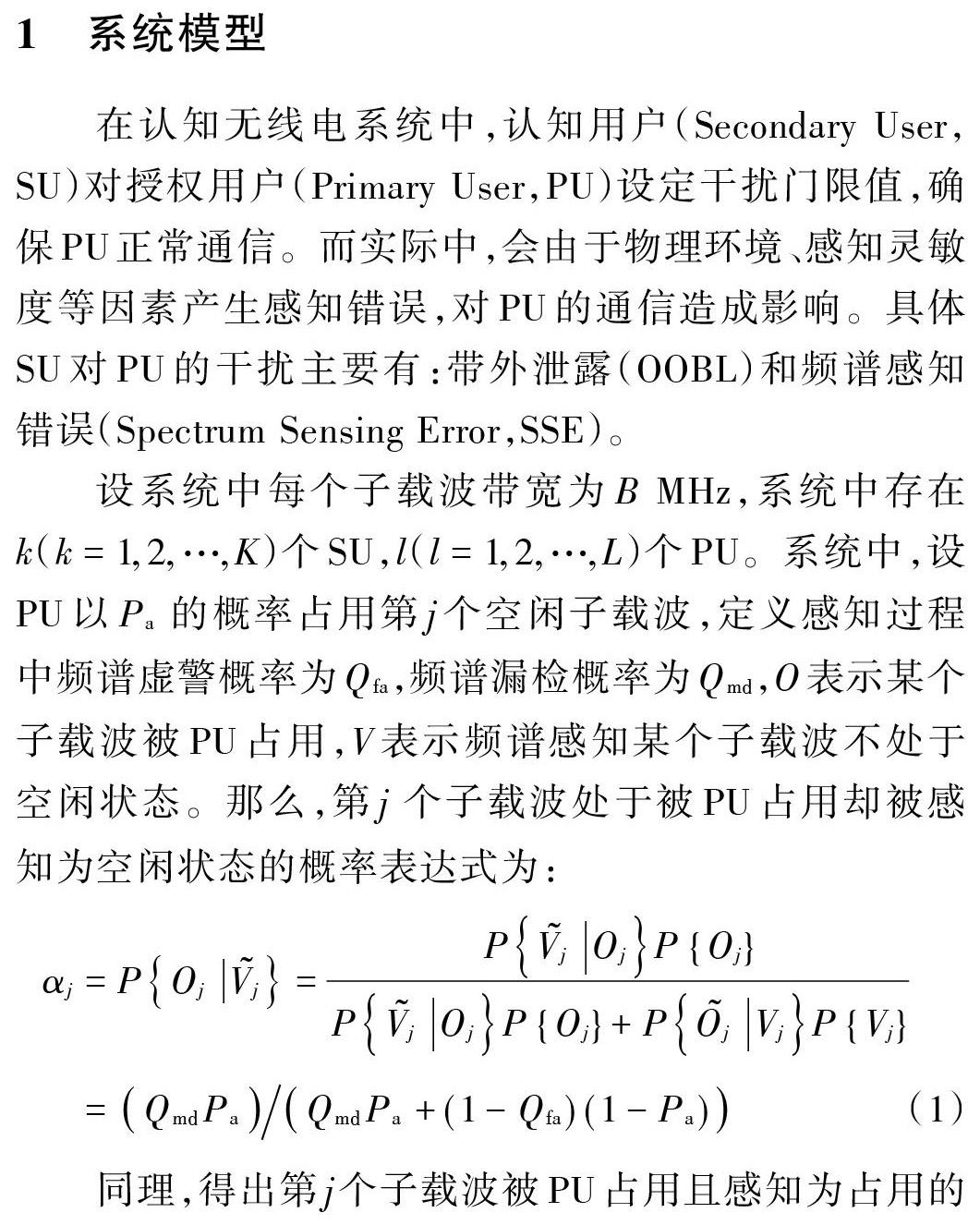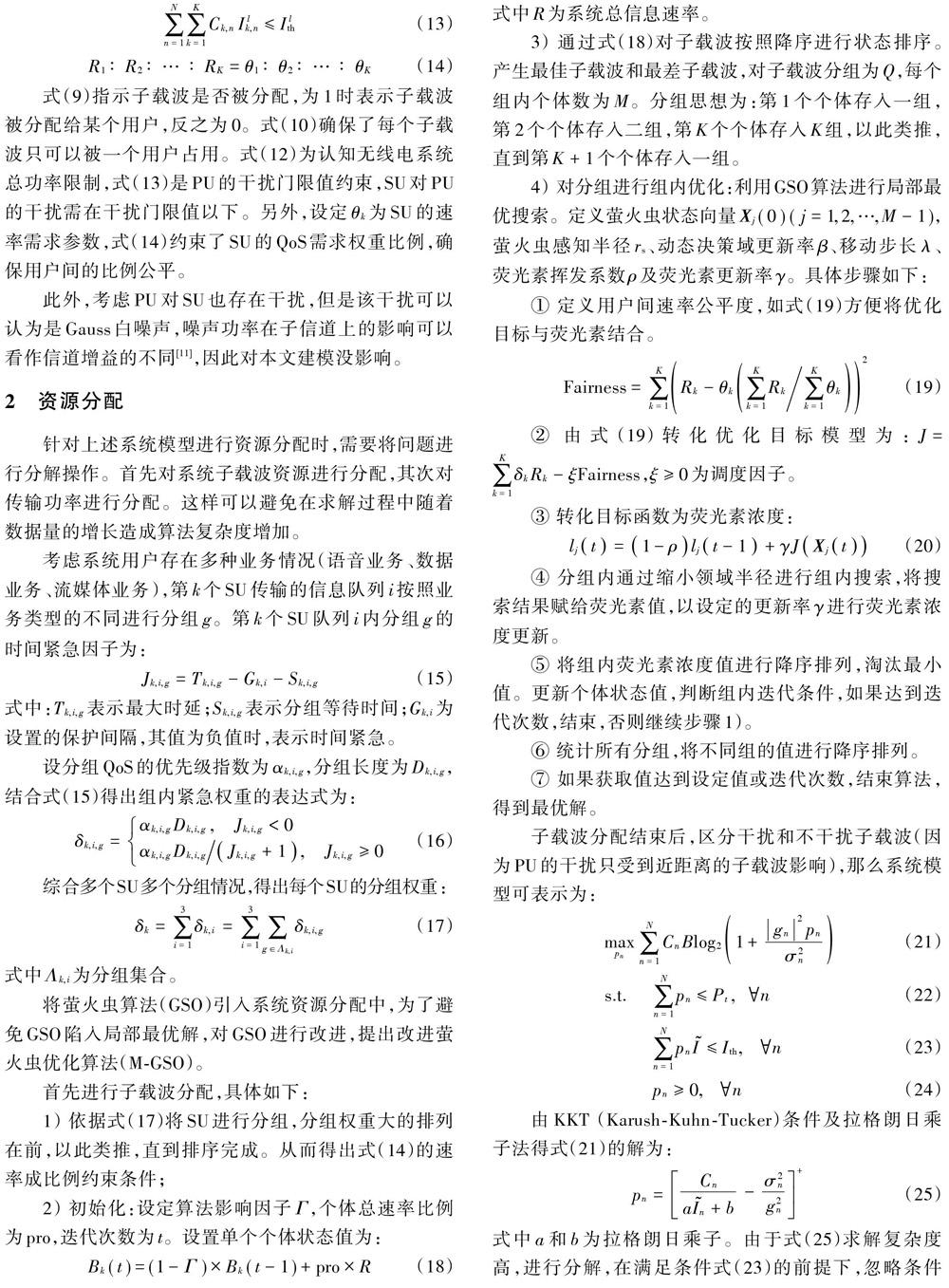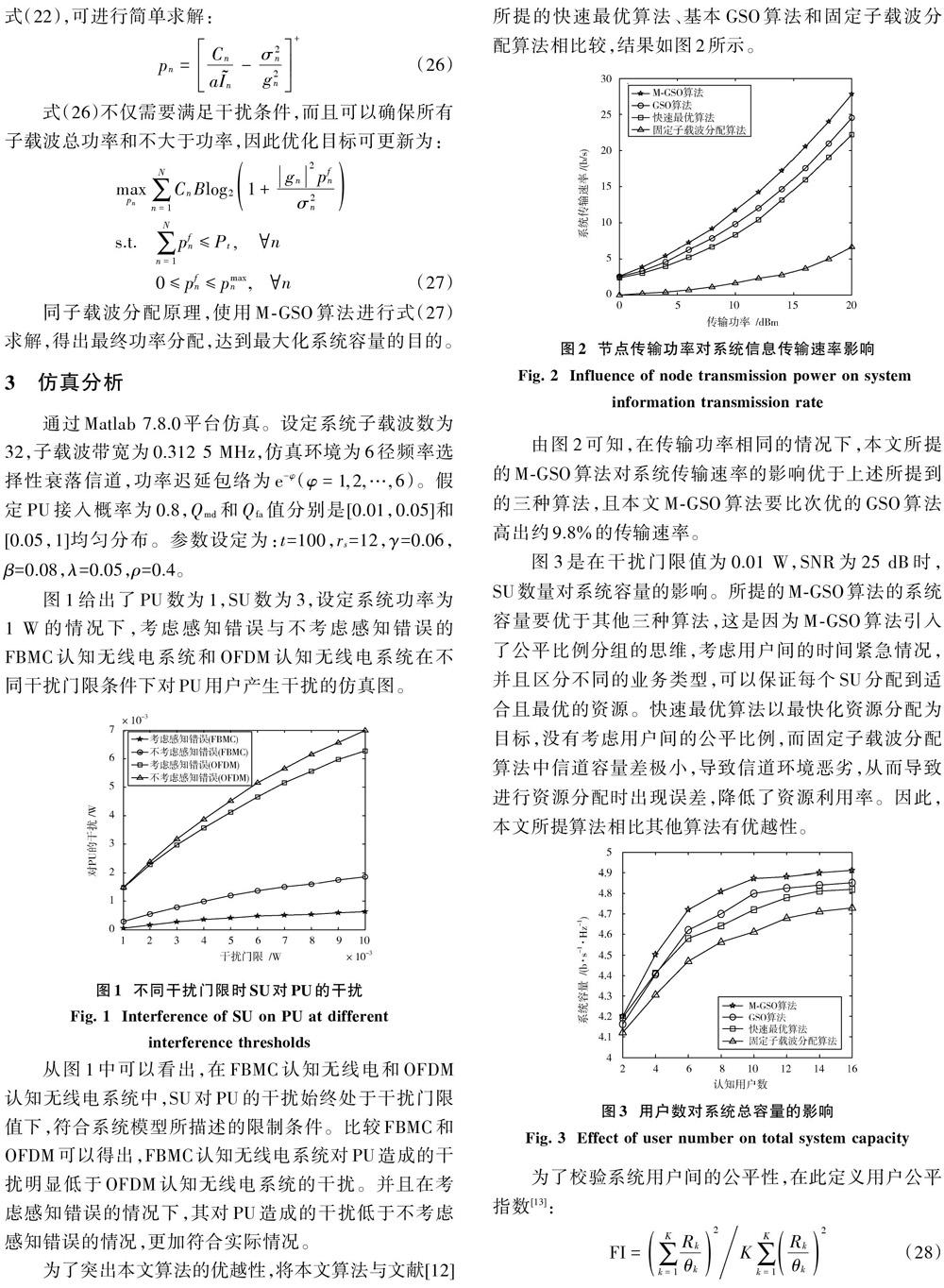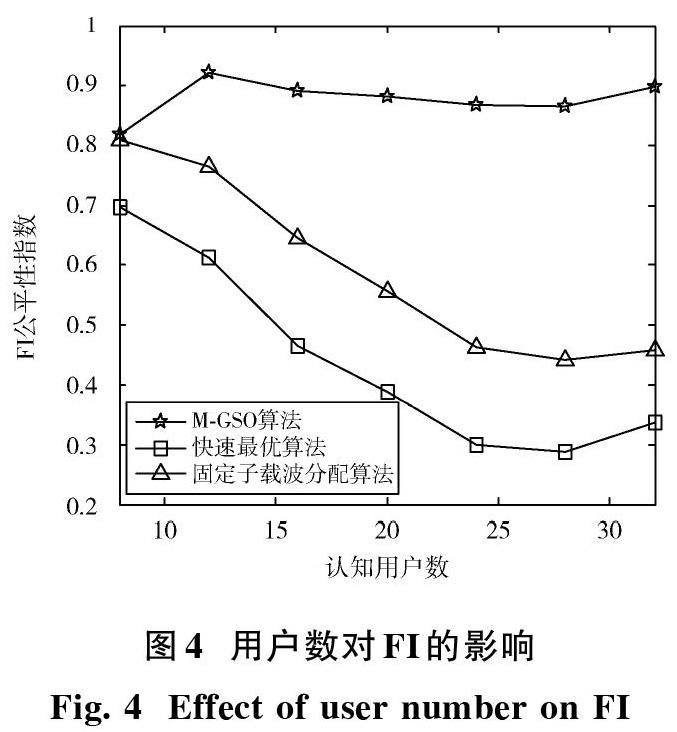分组比例公平M?GSO优化的FBMC认知无线电资源分配算法
廉昱晴 刘彦隆



关键词: 认知无线电; 群智能算法; 资源分配; 滤波器组; 正交频分复用; 频谱感知
中图分类号: TN92?34 文献标识码: A 文章编号: 1004?373X(2019)01?0033?05
Abstract: In the multi?carrier cognitive radio system with multiuser mixed business, the grouping proportional fairness thought is fused into the resource allocation according to the actual situation of spectrum sensing error to propose an improved swarm intelligence algorithm. On the promising the fairness of different users and on the basis of filter bank multicarrier (FBMC) technology, the state factor is introduced into the algorithm for mixed business to maximize the cognitive radio system. The swam intelligence algorithm is used to allocate the system resources reasonably for the multiuser business. The cognitive radio systems based on FBMC and OFDM are compared. The simulation analysis results show that the capacity of cognitive radio system based on FBMC is better than that of cognitive radio system based on OFDM while the algorithm has low influence on primary user communication, and the algorithm can ensure the fairness of users, and satisfy the QoS requirement of mixed business.
Keywords: cognitive radio; swarm intelligence algorithm; resource allocation; filter back; OFDM; spectrum sensing
0 引 言
无线通信多用户多业务的需求不断增加,所需的频谱资源的利用随之变得越来越大,无线资源越发紧张,提高无线频谱的利用率成为无线资源亟待优化的热点问题之一[1]。认知无线电(Cognitive Radio,CR)在确保授权用户正常通信的前提下,可以很好地感知空闲频谱资源,以提供更多的频谱资源,被认为可以有效地改善无线频谱资源匮乏的情况[2]。
自正交频分复用(Orthogonal Frequency Division Multiplexing,OFDM)技术提出以来,鉴于其可以动态地调整子信道的调制技术和发射功率,可以有效提高频谱利用率[3]。美中不足,OFDM技术存在循环前缀,具有较大的带外泄露(Out?of?Band?Leakage,OOBL)等问题,这些都会影响系统频谱利用率。相比OFDM技术,滤波器组多载波(Filter Bank Multicarrier,FBMC)技术,作为5G物理层备选技术之一[4],能够很好地降低带外频谱泄露,不需要循环前缀就可以提升频谱利用效率[5],能很好地应用于CR系统中。
目前,针对多载波认知无线电系统资源分配的研究已有一些。文献[6?7]在认知无线电OFDM系统中提出新的资源分配算法。文献[6]研究了在干扰受限的前提下,利用注水搜索算法进行系统功率聯合最优化分配,可以实现多认知用户对速率需求不同情况下,求得功效最大化,但其算法实现复杂度较高,没有考虑用户间比例约束。文献[7]则提出一种改进的遗传算法进行认知OFDM系统中的资源分配,但是没有考虑综合业务类型,且用户紧急程度并未设定。而文献[8]则研究了基于FBMC上行链路资源分配问题,并且与OFDM系统进行比较分析。文献[9]同文献[8]一样,在同样的系统环境下,对认知FBMC系统与认知OFDM系统的资源分配问题进行比较研究。文献[8?9]基于FBMC进行物理层传输,但是这两者均未将不同认知用户对传输速率需求不同考虑在内,没有引入调度策略。
综合上述研究,虽然对系统资源分配进行了不同程度的优化,但却都是设定在理想状态下,没有考虑认知无线电中由于感知误差或时延等因素对授权用户造成干扰,系统存在频谱感知错误的情况。
萤火虫算法通过全局随机性的搜索,由个体动态调整搜索范围来确定移动路径[10]。该算法简单易行,搜索速度快,但算法后期容易获取局部最优解,收敛较低,因此本文对其进行改进。
本文基于FBMC多载波认知无线电系统,结合实际情况,在考虑感知错误的前提下,将分组比例公平改进萤火虫优化(Modified Glowworm Swarm Optimization, M?GSO)算法用于系统资源分配中。算法先通过分组比例公平调度,在此基础上引入用户状态因子,再利用M?GSO算法进行资源分配,提高频谱利用率。




通过对用户间FI公平指数的比较,快速最优算法和固定子载波分配算法的用户公平指数明显低于本文所提算法,如图4所示。本文所提算法的公平性指数在0.8~0.9范围。在SU数量与业务类型相同的前提下,由于本文所提算法考虑了业务分组和用户分组时的时间紧急状况,将最优的资源分配给紧急用户,以此类推,确保了不同SU的资源需求和QoS质量,保证了用户的比例公平。

4 结 论
本文在FBMC认知无线电系统中,结合实际情况,将频谱感知错误考虑在内,引入分组比例公平的思想,将其与群智能算法——萤火虫算法相结合,提出一种改进的萤火虫智能优化算法。在系统资源分配的过程中应用所提算法将最大化系统容量为目标,更合理地进行资源分配。仿真结果表明,该算法在对授权用户通信影响很小的情况下,系统容量优于OFDM的认知无线电系统容量,且确保用户的公平,同时满足混合业务的QoS需求。
注:本文通讯作者为刘彦隆。
参考文献
[1] YU Bin, MA Piming, MA Yanbo. Resource allocation and energy management in OFDM?based cellular systems [C]// 2016 IEEE International Conference on Communication System. Shenzhen, China: IEEE, 2016: 1?6.
[2] JIA Min, GU Xuemai, GUO Qing, et al. Broadband hybrid sa?tellite?terrestrial communication systems based on cognitive radio toward 5G [J]. IEEE wireless communications, 2016, 12(23): 96?106.
[3] NI Chunxing, FENG Mingjie, LUO Kai, et al. Additive cancellation signal method for sidelobe suppression in NC?OFDM based cognitive radio systems [C]// 2015 IEEE Global Communications Conference. San Diego: IEEE, 2015: 1?5.
[4] FARHANG?BOROUJENY B. OFDM versus filter bank multi?carrier [J]. IEEE signal processing magazine, 2011, 28(3): 92?112.
[5] 尤肖虎,潘志文,高西奇,等.5G移动通信发展趋势与若干关键技术[J].中国科学,2014,44(5):551?563.
YOU Xiaohu, PAN Zhiwen, GAO Xiqi, et al. Development trend of 5G mobile communication and several key technologies [J]. China science, 2014, 44(5): 551?563.
[6] MAO J, XIE G, GAO J, et al. Energy efficiency optimization for OFDM?based cognitive radio systems: a water filling factor aided search method [J]. IEEE transactions on wireless communications, 2013, 12(5): 2366?2375.
[7] WANG Qian, ZHANG Hang, CHEN Qian, et al. A modified genetic algorithm for resource allocation in OFDM?based cognitive radio systems [J]. Wavelet active media technology and information processing, 2015, 9(12): 18?20.
[8] SHAAT M, BADER F. An uplink resource allocation algorithm for OFDM and FBMC based cognitive radio systems [C]// Proceedings of 2010 Cognitive Radio Oriented Wireless Networks & Communications. Cannes: IEEE, 2010: 1?6.
[9] ZHANG H J, RUYET D L, ROVIRAS D, et al. Uplink capacity comparison of OFDM/FBMC based cognitive radio networks [C]// 2010 IEEE International Conference on Communications. [S.l.]: IEEE, 2010: 1?5.
[10] LI Yongmei, ZHOU Yongquan, WEI Jun. Using hierarchical structure glowworm swarm algorithm for function optimization [J]. Journal of applied sciences?electronics and information engineering, 2012, 30(4): 391?396.
[11] WEISS T, HILLENBRAND J, KROHN A, et al. Mutual interference in OFDM?based spectrum pooling systems [C]// Proceedings of the 59th Vehicular Technology Conference. Wa?shington DC, USA: IEEE, 2004: 1873?1877.
[12] GE Mengyao, WANG Shaowei. Fast optimal resource allocation is possible for multiuser OFDM?based cognitive radio networks with heterogeneous services [J]. IEEE transactions on wireless communications, 2012, 11(4): 1500?1509.
[13] 张伟.认知OFDM系统建模及资源分配技术研究[D].邯郸:河北工程大学,2014.
ZHANG Wei. Cognitive OFDM system modeling and resource allocation technology research [D]. Handan: Hebei University of Engineering, 2014.

